Crime and deviance - Topic 8: Globalisation, Green crime, Human rights and State crime
Crime and globalisation-sociologist list
Key:
Heheh-Sociologist Heheh-Important information
Key information:
● Held et al (1999)
- Globalisation refers to the increasing interconnectedness of society
- Quote → "The widening, deepening and speeding up of worldwide
interconnectedness in all aspects of life, from the cultural to the criminal,
the financial to the spiritual'.
- Globalisation has many causes → spreads new ICT, influence global mass
media, cheap airlines, deregulation of financial markets, and easier
movements of businesses where profit is greater
The global criminal economy
- There has been a globalisation of crime → interconnectedness across
national borders
- Transnational organised crime has spread
- Globalisation itself creates new opportunities for crime
● Castells (1998)
- The global criminal economy is now worth over £1 trillion per annum
- Some forms of global crime:
1. Arms trafficking → e.g. terrorists
2. Trafficking in nuclear materials → from former communist countries
3. Smuggling of illegal immigrants → Chinese triads make an estimated $2.5
billion annually
4. Trafficking women/children → linked to prostitution/slavery
5. Sex tourism → Westerners travel to 3rd world countries for sex (esp, with
minors)
6. Trafficking in body parts → Organ transplants in rich countries
1
, 7. Cyber-crime → e.g. identity theft
8. Green crimes → the damage to the environment
9. International terrorism → based on ideological links via the internet
10. Smuggling of legal goods → e.g. tobacco/alcohol to evade tax and sell in
third world countries
11. Trafficking in cultural artefacts → stolen works of art
12. Trafficking in endangered species → e.g. ivory trade
13. Drugs trade → worth an est. $300-400 billion in terms of street price
14. Money laundering → organised crime is worth $1.5 trillion per year
- Global crime now has a supply-and-demand aspect
- Demand for products in the West increases the scale of organised transnational
crime
- Services demanded in the West are the reason why a supply aspect is needed
(e.g. sex, workers, etc)
- Supply is linked to the globalisation process → e.g. third-world producing
drug countries like Peru have a high rate of peasants, so with the little IT
needed to sell high-priced drugs compared with low low-price drops, it is
an attractive business venture
→ e.g. 20% of Columbia's population depends on the drug trade for their
livelihood, and cocaine sells out all other exports
Global risk consciousness
- Risk consciousness → Risk is seen as global rather than tied to particular
places
→ e.g. increased movement of migrants seeking asylum and refuge has
raised concern in Western countries about the risk of crime and disorder,
and the need to protect Western borders
- As most information comes from the media, it often gives an exaggerated view
of the dangers
→ e.g. media creates moral panics about immigration as a ‘threat‘, often
fueled by politicians
2
, → Negative coverage of immigrants as ‘terrorists’, and them ‘flooding the
country’ has led to hate crimes against ethnic minorities in several EU
countries (including the UK)
- This results in an intensification of social control at a national level
→e.g. the UK has toughened their border control, regulations, and legal
limits on aeroplanes
→ other countries have put up large gates, thermal detection, sonic wave
systems, etc to limit illegal border crossing
Globalisation, capitalism and crime
● Taylor (1997)
- Globalisation had led to changes in the pattern and extent of crime
- Globalisation → greater inequality + rising crime
- Created crime at both ends of the social spectrum:
1. TNC move businesses to low-wage countries → produces job insecurity in
unsafe working conditions
2. Deregulation = Governments have little control over their country's economy
→e.g. welfare spending decline while trying to create jobs/raise tax
3. Marketisation → people see themselves as individual consumers which
undermines the ideology of social cohesion
- Left realists view → increasingly materialistic culture promoted by the
global media portrays success in terms of consumption
- This leads to more crime, especially from the w/class, as it creates insecurity
and widens inequalities
- Lack of legitimate jobs means that people are more likely to turn to illegitimate
jobs (e.g. LA has de-industrialised which has led to the growth of drug gangs -
10,000 members)
- This leads to more crime committed by elite groups, due to a large scale of
opportunities → e.g. deregulation of financial markets has created
opportunities for inside trading and movement of funds to tax evade
- Creations of transnational bodies (e.g. European Union) have offered
opportunities for fraudulent claims for subsidies
- Leads to new patterns of employment → new opportunities for crime
3





